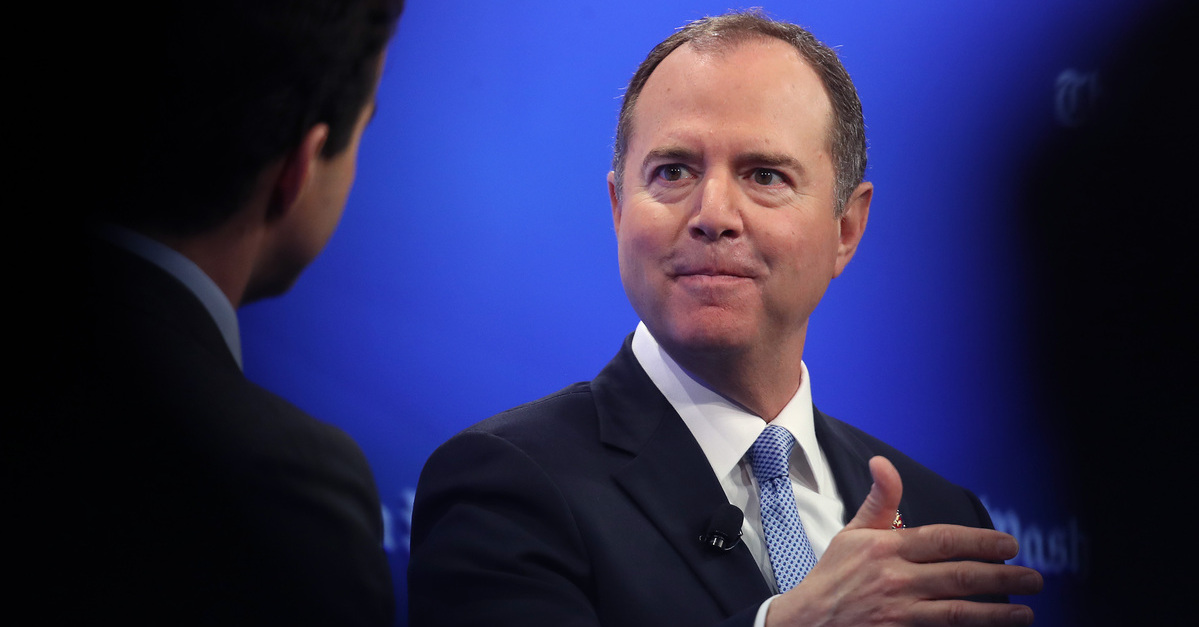
Saddle up, everybody. You’re about to see checks and balances hit the big time.
Our democracy is not for sale. We must stop the flood of dark money from drowning out the voices of everyday citizens.
That’s why I just introduced a constitutional amendment to overturn Citizens United and restore power to the American people. pic.twitter.com/YNYzb35uSf
— Adam Schiff (@RepAdamSchiff) May 8, 2019
On Wednesday, Rep. Adam Schiff (D-CA) introduced a Constitutional Amendment that would function to overturn the Supreme Court decision in Citizens’ United.
According to Schiff, the proposed Amendment would allow reasonable limits on donations and options for public financing for candidates.
A Constitutional Amendment for any purpose is a pretty big deal, so let’s break all of this down.
What happened in Citizens United and Why Would We Need to Change the Constitution to Overturn It?
Citizens United v. Federal Election Commission was a 2010 Supreme Court case that caused major ripples in the political world. The dispute arose when Citizens’ United (a conservative non-profit group) wanted to air an anti-Hillary Clinton film on television right before the 2008 Democratic primary. Under the Bipartisan Campaign Reform Act (BCRA), corporations were prohibited from paying for political broadcasts so close to an election.
A very fractured Supreme Court handed down a 5 to 4 decision centered around freedom of speech; under the First Amendment, it ruled, the government cannot restrict corporations, nonprofits, unions, or other associations from political speech. And according to the Court, spending money equals political speech. The section of the BCRA dealing with prohibitions of broadcasts was struck down, and high drama ensued.
Since SCOTUS’ decision in Citizens United, fear of undue corporate influence in American government cannot be overstated. The case has become a rallying cry for many who believe it to be the gateway to excessive government-sanctioned “dark money” in political campaigns. Public outcry aside, the case and its interpretation of the breadth of free speech stand as the law of the land – unless of course, that law is changed via Constitutional Amendment.
Remember, the judiciary’s role is to interpret law, not to make law. SCOTUS held that the broadcast section of the BCRA didn’t mesh with Constitutional guarantees of free speech. However if those guarantees are modified, then federal and state laws can be drafted that restrict political contributions in just the way BCRA sought to do. And right there, your fifth-grade lesson on checks and balances hits nightly cable news.
What would the Amendment do?
Schiff promised that his Amendment will “restore power to everyday citizens.”
The language of Amendment reads:
Nothing in this Constitution shall be construed to forbid Congress or the states from imposing reasonable content-neutral limitations on private campaign contributions or independent election expenditures.
In other words, Congress can make some laws that restrict free speech when that speech comes in the form of campaign contributions. It also includes language that clarifies its limits:
Nor shall this Constitution prevent Congress or the states from enacting systems of public campaign financing, including those designed to restrict the influence of private wealth by offsetting campaign spending or independent expenditures with increased public funding.
Under those guidelines, individual states are still welcome to publicly subsidize political campaigns.
How does the Amending the Constitution even happen?
It’s a long, long process. Schiff just got the ball rolling, but it’ll be an uphill climb from here on out. Under Article V of the Constitution, the first step is that a two-thirds majority of both houses of Congress would need to adopt a joint resolution. Next, the proposed Amendment would head to the states for approval. Three-fourths of the state legislatures (or 38 states, to be exact) would need to approve the Amendment for it to pass. Congress also has the option to bypass the joint resolution phase and go right to calling a national convention of state legislatures – but that’s not likely the method that would be used for Schiff’s Amendment.
If a proposed Amendment were to actually garner the requisite number of votes, it becomes part of the Constitution automatically. To formalize that process, the Office of the Federal Register (part of the National Archives) drafts a formal proclamation, and the National Archivist certifies that the amendment is valid and has become part of the Constitution.
Will Schiff’s idea actually work?
Probably not. Getting 2/3 of Congress to do anything is nearly impossible. Getting 3/4 of the states to agree is even more of a longshot. History tells us that even when there is broad agreement for an Amendment, adopting it can be difficult.
A perfect example is the Equal Rights Amendment (ERA). The ERA, which would establish women’s equality as a matter of Constitutional law, was first introduced in 1923. The ERA enjoyed enthusiastic support from both political parties, both houses of Congress, and three presidents. It still hasn’t passed – although maybe Amendments are all the rage up on Capitol Hill, because Congress held the first ERA hearing in 36 years just over a week ago.
By contrast to the ERA, an Amendment to overturn Citizens’ United would likely be even less attractive to many lawmakers. Procedurally, Schiff is trying to pull rank on the Supreme Court, which is a tough sell for any purpose. Substantively, many of those whose votes are necessary stand to benefit from the Citizens’ United outcome. And even if elected officials voted ideologically and without thought of self-interest, Schiff’s Amendment proposes to constrict the legal territory of free speech – which would be at odds with ideals championed by civil libertarians.
Still, the U.S. Constitution has been successfully amended 27 times in the past, most recently in 1992. That Amendment had originally been proposed all the way back in 1791, and is a prohibition on laws that change the salaries of Congress members in between Congressional terms.
[image via Win McNamee/Getty Images]
This is an opinion piece. The views expressed in this article are those of just the author.